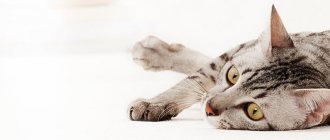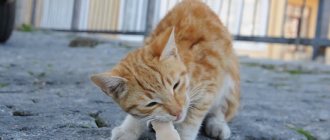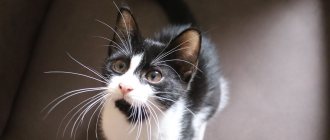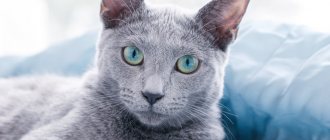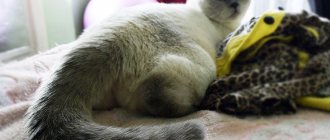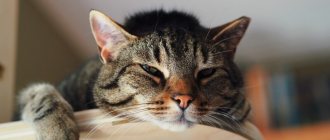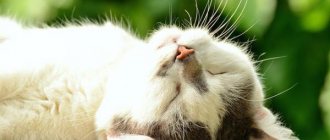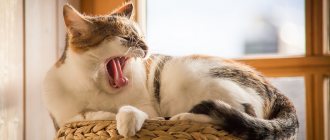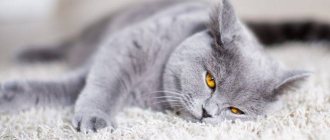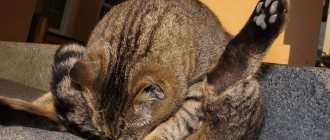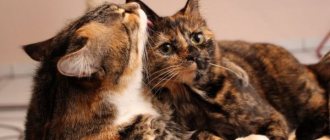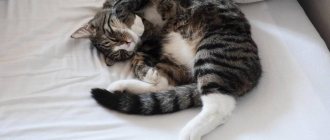Chronic kidney disease
Chronic kidney disease is one of the most common diseases in older cats.
The kidneys produce important hormones, filter waste from the blood, help regulate blood pressure, and promote the production of new red blood cells. When a cat's kidneys stop functioning properly, it leads to a variety of other problems.
Increased thirst and urination are among the first signs of kidney disease in a cat, followed by loss of appetite, weight loss and lethargy.
Chronic kidney disease cannot be completely cured, but it can often be treated with medications, diet changes, and fluid intake.
Treatment methods
When a cat suddenly begins to eat a lot, it may be expecting a replenishment. Her body requires more food for the babies growing inside. Before treatment, you should make sure that the individual is not carrying kittens. In case of severe illnesses, the doctor prescribes a course of necessary medications, IVs, and injections. If there are infestations, then it is necessary to eliminate the unwanted inhabitants with the help of medications. In the absence of the opportunity to purchase special cat medications, you can use the human drug - Pirantel. As cats get older, their appetite may either increase or decrease. To maintain the health of your pet, it is recommended to undergo regular examination of the animal at the veterinary clinic. If necessary, urgently take measures to treat your beloved four-legged friend.
Diabetes
Diabetes mellitus is another common disease that affects cats. This endocrine disorder affects the pancreas's ability to produce insulin, a hormone needed to regulate blood glucose levels.
Signs of diabetes include weight loss, increased appetite, thirst and urination, and lethargy. Diabetes is usually treated with insulin and diet changes.
Other medications may be used. Some cats will even return to normal after several months of treatment.
What is the optimal weight for an adult cat?
Depending on the breed, the pet’s weight varies from 3 to 7 kg. Mature animals are usually fit and lean, especially if it is a male, who is losing weight and gaining weight constantly. The lifestyle of a healthy cat is active and dynamic. After “playing”, the pet wants to drink a lot, the animal eats abundantly, which has a positive effect on the digestive processes.
© shutterstock
Dangerous symptoms of weight loss include:
- Lethargy, apathy . Sudden mood changes are evidence of anxiety. The cat feels bad and cannot find a place for itself, does not play and refuses food.
- Blood, frequent diarrhea . If the cat has lost weight and foreign inclusions are observed in the urine and diarrhea, you need to go to the clinic and have tests done.
- Bloating . Do not confuse high weight with a bloated stomach. The cat may become worse and worse due to internal swelling, infection, infection, which is why he does not eat.
Gastrointestinal problems
Any problem in the gastrointestinal tract can affect a cat's weight. First, problems with the gastrointestinal tract can reduce your appetite. Second, some problems prevent the gastrointestinal tract from properly digesting food and absorbing nutrients, leading to weight loss.
Some gastrointestinal problems seen in cats include intestinal parasites, inflammatory bowel disease, pancreatitis and other pancreatic problems, and even gastrointestinal cancer.
Gastrointestinal problems can cause loss of appetite, weight loss, vomiting, diarrhea, lethargy and more. Treating gastrointestinal parasites can be as simple as deworming your cat.
Other gastrointestinal problems usually require medications and supportive care.
Non-dangerous causes of loss of appetite
There are many reasons that can cause a cat to eat poorly. Some of them are completely harmless, while others are quite worrying. They range from just a pet’s bad mood to serious health problems.
Why does a cat eat poorly and what affects this:
- suffered stress;
- weather change;
- change of environment or food;
- exacerbation of the instinct to procreate.
These reasons are not serious and are quite easy to overcome. There are other factors as well, but they are not as common. To understand how to restore your pet’s appetite, you need to consider each point in more detail.
Past stress
The mood of cats can be very changeable, and anything can affect it. If the animal has gone through a move, a bath or, for example, a haircut, it is not surprising that stress has fallen on it. In such a situation, the furry friend sleeps a lot and refuses to eat. Don't worry too much about this. After some time, the pet will return to its normal rhythm of life, but if the owner wants to speed up this process, it is better for him to pay more attention to the cat. Any creature feels better from affection, so it is recommended to surround your pet with warmth, play with it or treat it with an unusual delicacy.
Change of weather
As surprising as it may sound, cats are very sensitive to weather changes. As soon as a cloud covers the sun, the animal immediately stops having fun, becomes lethargic and eats poorly. Changes in weather due to season also affect a cat's appetite.
For example, in cold times, in autumn and more often in winter, cats constantly sit near something warm. Fat reserves also help them keep warm, so pets eat every now and then. In the summer, when it gets hot, cats begin to eat much less. This is due to the fact that a large amount of food is digested and gives energy, and in order to spend it, you need to move. The animal is hot from the weather, and unnecessary movements will bring even more discomfort. Therefore, you should not be surprised that your pet eats little and drinks much more in the summer, because he is simply trying to regulate his body temperature.
Change of environment or food
As mentioned above, any changes in a cat’s life can be stressful for him. This also includes a change of environment. It's not just about moving. Even the slightest rearrangement of things or furniture becomes something new and unknown for the animal, which you have to get used to again.
Also, the appearance of a stranger at home can be a reason for a sharp change in the mood of a mustachioed friend. This could be a new person or a pet. If it seems to the cat that the stranger is dangerous, vying for food or affection, then the animal may temporarily close itself off from everyone and refuse to eat until it gets used to the newcomer.
What can we say about drastic changes, if even a new bowl can cause a furry friend to eat poorly. What's in her bowl has a particularly strong influence on a cat's appetite. Often, food becomes the main factor influencing the animal’s appetite. If the food is not to his taste or is of poor quality, the pet may try to express this by refusing.
If the owner is forced to change food for any reason, it is better to do it gradually. You can mix the new food with the old one, so the cat will not notice the catch, and in the end it will completely switch to the new food. It is better to make any changes gradually so as not to shock your pet.
Increased procreation instinct
There come periods when cats put on whole shows. Then they not only eat poorly, but also have strange habits. You don’t need to think long to guess that your pet’s sexual instinct has activated. During estrus, cats almost completely lose their appetite. Hunger strikes can last up to a week, and the animal can lose a lot of weight. However, there is no reason to worry, because when the natural instinct weakens, the pet will have an appetite again.
Dental problems
Oral and dental problems can cause severe pain, reduce appetite and lead to weight loss. Common dental problems in cats include periodontal disease, resorptive lesions, and dental fractures.
Some cats develop stomatitis, a painful inflammation of the cat's mouth and gums that may be immune-mediated.
Signs of dental problems include bad breath, drooling, paws in the mouth, or even bleeding from the mouth.
The first step to treatment is for your veterinarian to give your cat anesthesia and, if necessary, professional dental cleaning, examination, and treatment. Some cats will require oral surgery and/or tooth extraction.
Flora
Flora's cat transformation happened twice. At the beginning, Flora transformed from a skinny cat into a clone of Garfield, and with the next owners - back.
The new owners put Flora on a diet: the cat was allowed to eat only 1 can of cat food a day and exercise on the fence next to the house. As a result, Flora lost more than twice her weight. Now her weight is only about 2 kg, which corresponds to the cat norm.
Like all domestic cats who have lost weight, Kato lost weight thanks to his owner. To prevent Kato from being haunted by hunger pangs, the owner resorted to a trick. He gradually reduced the amount of food in the bowl until he settled on the desired amount. So the cat lost almost half of its own weight without noticing any changes in its diet.
Attention! All the cats we talked about lost weight under the supervision of veterinarians. We do not recommend limiting your cat's food without consulting a doctor, as this can lead to serious liver diseases.
Stress
Cats can be very sensitive to changes in the home. Because they are often good at hiding outward signs of stress, they may develop more severe symptoms later.
Any environmental factors can cause anxiety and stress in a cat. Decreased appetite is a common sign of stress, which ultimately leads to weight loss.
There are a number of other health problems that can lead to weight loss. If your cat has a health problem, you may or may not notice other signs of illness.
In addition, many diseases have similar symptoms, so a veterinarian is needed for diagnosis.
What to do if your cat has lost a lot of weight?!
What to do when your cat has lost a lot of weight
? First of all, check her for the presence of skin parasites and give her an anthelmintic. If she is nervous and losing weight from stress, it is good to leave the animal alone for a while. If there are complications after pregnancy and serious illnesses are suspected, then it must be shown to specialists. The necessary tests will show the presence of a source of disease in the body.
When the animal is weakened, it is better to call a veterinarian at home to provide first aid and initial diagnosis.
The veterinarian arrives within 2-3 hours after the call during the day and within 1-2 hours at night. you can also call the veterinarian on a specific day at a convenient time.
Treatment for weight loss in cats
In this case, treatment for cats depends on the cause of weight loss. If you notice that your cat is losing weight, the first step is to make an appointment with your veterinarian.
Your veterinarian will first perform a physical examination. Lab tests and/or x-rays may then be needed to determine the problem. Based on the results, your veterinarian may recommend medications, diet changes, surgery, or other treatments.
If your veterinarian determines that your cat is healthy, the weight loss may be caused by inadequate food intake or some unknown or undetectable medical condition. Ask your veterinarian about proper feeding.
He can recommend a diet with the right amount of nutrients and calories to help your cat gain weight.
If you can identify a source of stress for your cat, start by reducing that stress.
If your cat continues to lose weight despite changes you've made to her lifestyle, be sure to consult with your veterinarian about this. Your veterinarian may refer you for advanced testing.
What will my veterinarian do?
If you are concerned about your cat's weight and appetite, you should take your pet to the vet for a check-up. If your cat goes outside a lot, you may not notice vomiting or diarrhea, so don't assume it's not happening. Weight loss may be the only sign you notice.
Your veterinarian will check your pet first, but may also recommend further tests. Blood samples can help evaluate your cat's overall health by analyzing the liver, kidneys, blood sugar levels, and thyroid hormones. Urine samples can detect infections and elevated sugar levels, while fecal samples can detect any parasites or bacterial infections. Sometimes an x-ray or ultrasound may be needed to make a diagnosis.
Your veterinarian will walk you through the process step by step and determine recommended diagnostic or treatment options for your cat.
Posted by Christian Adams An American expat living in Metro Manila, Philippines for over a decade, Christian is a lifelong cat lover and the proud father of two rescue cats, Trixie and Chloe. Both girls used to be among the crowds of homeless people who roam the cities and countryside. Three-year-old Trixie was rescued from a litter found under a neighbor's porch, and two-year-old Chloe was brought home by Christian's young son, Henry, who discovered the crying kitten in the parking lot.
How to Prevent Weight Loss in Cats
You can prevent your cat from losing weight by regularly monitoring its body condition and visiting your veterinarian regularly for health checks.
Cats are good at hiding illness and injury, but a veterinarian can detect a problem before it gets out of control.
Be sure to tell your veterinarian about any changes in your cat's behavior. It is much easier to treat a health problem in its early stages than to wait until your cat is very sick.
Hyperthyroidism in cats
Kidney failure in cats
Diabetes in cats - symptoms and treatment of the disease
Inflammatory bowel disease in cats
Intestinal obstruction in cats
Cancer in cats: types, symptoms, prevention and treatment
Why do you lose weight?
If a cat eats a lot but is losing weight, there are a number of reasons that can be identified::
- Worms . Helminths or worms destroy the animal's body from the inside. Even if the cat eats a lot, the pet loses weight. Helminths get inside the animal from dirty shoes, unwashed hands, or a dirty tray. Cleanliness and hygiene will protect the cat. To combat worms, special products are sold that are taken on average for about six months.
- Damage to internal organs . An analysis at a veterinary clinic will help answer the question of why a cat is losing weight. Disturbances in the digestive system are also noticeable externally. These are impurities in the urine and stool consistency, and an unusual color. During the period of illness, the pet’s appetite decreases and he eats little.
- Stress . The problem may be the arrival of a new pet. The cat's health is under serious stress due to nervous stress. Therefore, a once fat cat may begin to lose weight in just a couple of months. Any changes for a pet take a long time to get used to.
- Summer heat . If a cat loses weight in the summer and has a good appetite, this is normal. During the summer season, the furry animal sheds its fur, and due to temperature stress, it eats less than in frosty winters.
- Age . An old cat eats less than a young one. This is due to low mobility. An older cat that is losing weight should still be checked by a veterinarian, but for animals that sleep most of the time, weight loss is common.
- Tumors . Neoplasms on the body, and especially in the body, are not easy to detect. With benign tumors, the cat should not lose weight.
- Feed _ The quality of food determines the weight of the animal, how quickly it loses weight, how much it eats, and affects processes in the body. You should not suddenly change your cat’s diet from dry to liquid or to homemade food. Even a dog that is less picky about food will not begin to gain weight from this. Changing the menu for a pet is a consistent and long process, during which it loses weight in any case.
Anorexia in a cat (the cat refuses to eat)
Anorexia in a cat.
A cat's loss of appetite is called anorexia.
The desire to eat arises in an animal if it receives positive emotions, the absence of illnesses, or as a result of building an associative series, for example, packaging food will make the cat remember about food. Loss of appetite in animals is associated, first of all, with the appearance of a negative factor - a disease that requires immediate intervention from specialists .
Important! You cannot self-medicate or test various techniques on an animal, since the lack of desire to eat can be caused by various diseases.
Deviation or norm?
Before taking any measures, you need to make sure that the pet is really very thin. Each breed has its own average performance. For example, outbred cats weigh from 3.5 to 4.5 kg, British and Siberian breeds - from 5-7, Maine Coons - from 8 to 12.
© shutterstock
Lack of weight can be determined by palpating the animal's body. If the ribs are well felt and the fat layer is insignificant, this is a deviation from the norm. In cases where the physiological causes listed below are excluded, consultation with a doctor is required.
An alarming sign is if the cat looks thin visually, its ribs, spine and pelvic bones protrude, and there is no fat layer . The stomach is sunken, and the silhouette resembles an hourglass. Such signs indicate exhaustion of the body. A veterinary examination and serious treatment is required.
Symptomatic diet and procedures
All diseases require specific treatment and a special diet prescribed by a doctor.
In some cases, for example, with allergic rhinitis, the animal's appetite can be stimulated. Mackerel is used for this; its aroma increases the cat’s desire to eat.
It is also important to make your diet balanced. Experts recommend that breeders follow certain rules when caring for a pet. Thanks to their observance, the animal’s weight will not fall:
- It's better to stick to one food option. If the breeder decides to feed the pet branded food, then it should not be mixed with table food. Conversely, when eating homemade products, it is not recommended to introduce food from the store into the diet.
- If your cat eats dry food, you need to increase the daily amount of liquid.
- You should not feed your cat cheap, low quality food. As a rule, it contains attractants - substances that are addictive. It is because of them that after introducing cheap food into the diet, the cat refuses other food.
- When feeding natural food, the diet should include fermented milk products and meat daily. Fish – no more than 2-3 times a week, exclusively boiled.
- You can supply your food with vitamins and minerals using powdered dietary supplements, which are sold in pet stores.
- Don’t forget about the presence of fresh green grass on your pet’s menu. It has a good effect on intestinal motility and supplies the animal’s body with additional vitamins.
Determination of the degree of fatness
You should not talk about weight loss without first determining whether the animal has really lost weight. This is done as follows:
- The first and most common sign of exhaustion is “fence” ribs. This means that the ribs protrude strongly from under the skin, and therefore can be easily felt even after a light touch, not to mention palpation.
- When you palpate the base of the tail, you can feel its “bone” structure; you can easily find the sacral bone and the first caudal vertebrae.
- If you look at a cat from above, it is easy to notice that its figure is very similar to an hourglass. However, their back part will be greatly narrowed, while the back of the animal is clearly pointed, it is awl-shaped.
- When palpating the paws (especially the front ones), even an inexperienced person can determine the shape and structure of the bones. Simply put, the limbs resemble pieces of a skeleton covered in skin. The muscles are flabby and jelly-like to the touch.
